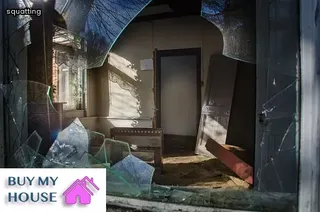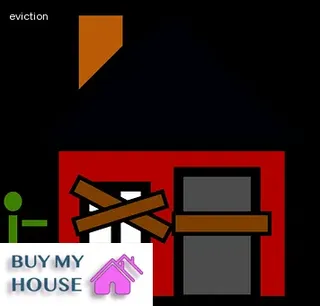Squatter's rights in Kentucky are based on the principle that a person who lives in a property without the consent of the owner for a certain amount of time can obtain certain rights to that property. The legal term for these rights is Adverse Possession and it is commonly referred to as Squatters Rights.
In order to obtain these rights, an individual must occupy the property openly, without permission from the owner, continuously for a specific period of time (20 years in Kentucky). During this period of occupancy, they must pay taxes on the land, show evidence of improvements made to the land and use it exclusively.
If all conditions are met, then squatter’s rights may be granted by a court. This means that if someone has been occupying an abandoned property for 20 years or more and have been paying taxes on it and making improvements to it during that time, they can petition the court and gain legal title to the land.
Once this happens, they will have full ownership rights over the property including the right to sell it or pass it down as inheritance.

Adverse possession is a legal principle in Kentucky that allows someone to acquire title to an otherwise unowned property by occupying it for a prescribed period of time. This concept is often referred to as squatter's rights and can be a powerful tool for those without the ability to purchase or rent housing.
In order to understand the implications of this practice, it is important to analyze Kentucky adverse possession laws carefully. The first step is determining whether the property qualifies for adverse possession since not all real estate qualifies under this law.
Generally, land must be abandoned or used without permission from the rightful owner in order to qualify. The amount of time required also varies depending on how long the property has been occupied and whether any improvements have been made; however, most states require at least seven years of undisputed occupancy before title may be transferred through adverse possession.
Additionally, there are many other limitations that can affect one's ability to obtain title through this process such as legal requirements related to taxes and notices that must be fulfilled before title may pass. Therefore, anyone interested in pursuing squatter's rights should consider these factors carefully before beginning their journey.
In Kentucky, it is important to understand when squatter's rights do not apply so that you are aware of your legal rights and obligations. Squatters' rights are a form of adverse possession, where someone who occupies a piece of land or property without the owner’s permission can eventually gain ownership.
However, squatting on public or private land is illegal in Kentucky, and certain conditions must be met for a squatter to gain legal possession. Generally, the squatter must have lived on the property openly for at least 15 years and must have paid all taxes due on the property during this time period.
Additionally, in order for squatters' rights to be valid, the owner of the property cannot have objected to their presence on the land during those 15 years. If any of these conditions are not met, then squatting will not be recognized as an acceptable means of obtaining property rights.
As such, it is important to understand these laws in order to protect your interests and ensure that you remain within legal boundaries when it comes to owning or occupying another person’s property.

Adverse possession, or squatting, is a controversial legal concept that has caused heated debates in many states, including Kentucky. While it is illegal in some areas such as New York City, Kentucky allows squatter’s rights in certain situations.
For those wanting to explore their options with respect to adverse possession laws in the state of Kentucky, there are both advantages and disadvantages to consider. On one hand, adverse possession can be an effective way for people who are struggling financially to obtain a roof over their heads at no cost.
On the other hand, squatting may be seen as an infringement of property rights and an unfair taking of land from its rightful owner. Additionally, adverse possession claims often involve complex legal matters that require thorough research and knowledge of state statutes.
With this guide to housing laws related to adverse possession in Kentucky, individuals can get informed on the pros and cons so they can make an informed decision on whether or not to pursue this option.
Squatting is the act of occupying an abandoned or otherwise unused space without permission from the legal owner. In Kentucky, squatters’ rights are governed by a variety of laws and regulations, which can be complex and difficult to understand.
To make matters worse, it is not always clear when such laws apply and what legal remedies are available to those facing eviction or other issues related to squatting. To help demystify these laws, this article will explore the various rights and obligations associated with squatting in Kentucky, including who has authority to evict a squatter, whether squatters have any rights if they are evicted, and what recourse a squatter may have if they feel their rights have been violated.
It will also provide an overview of ways in which these laws may be enforced and suggest steps for protecting oneself against potential legal problems associated with squatting in Kentucky.

Adverse possession is a legal concept that allows for the transfer of land ownership when certain criteria are met. In Kentucky, adverse possession laws are in place to protect the rights of squatters who occupy or otherwise show continuous use and ownership of a piece of property.
To be eligible for adverse possession in Kentucky, the claimant must have had exclusive occupancy of the land for at least 15 years — continuously and without permission from the true owner — and must have made improvements to the property or paid taxes on it. The courts also require that any claims be made with good faith, meaning there was no malicious intent behind the claim.
For squatters in Kentucky looking to secure their rights over their land through adverse possession, they should be aware of all applicable laws before attempting to make a claim.
When dealing with squatters in Kentucky, it is important to understand the laws and regulations that are in place to protect both the homeowner and the squatter. There are a few strategies that can be used to prevent squatting in the first place.
Most importantly, property owners should take proactive steps to secure their properties by installing locks, fences, and other physical barriers. Additionally, it can be helpful for homeowners to keep an eye out for suspicious activity and report any potential squatters to local law enforcement.
Homeowners should also be aware of any rental or unused properties they own and ensure that no one has unauthorized access. Finally, if a homeowner finds him or herself with a squatter on their property, they should act quickly by setting up an eviction notice or seeking legal assistance from a housing attorney.
Taking these precautions can help alleviate any problems related to squatting in Kentucky before they become too serious.

One of the questions asked most often by property owners in Kentucky is how to protect their property from trespassers. Squatters, who are individuals or families without legal rights to occupy someone else’s land or home, can be a problem for many homeowners.
Fortunately, there are ways to prevent squatters from occupying your property and damaging it. The first step is to know what your rights are as a homeowner.
In Kentucky, landowners have the right to deny access to land they own and they can also demand that trespassers leave immediately if they gain access illegally. As a homeowner, you should also make sure that your property boundaries are clearly marked and that signs indicating “No Trespassing” are posted in visible areas around your land.
Additionally, you may want to consider installing a fence or other type of barrier around your property line in order to further discourage trespassers from entering your land. Finally, it is important that you keep an eye out for any suspicious activity on or around your property and contact law enforcement if needed.
Following these steps will help ensure that your property remains safe from trespassers and squatters in Kentucky.
Removing a squatter from property can be complicated as there are legal implications to consider. Kentucky state laws require that property owners must follow specific procedures in order to legally remove squatters from their land.
In most cases, the owner must first provide written notice that they want the squatter to leave, then file an action with the local court and obtain an eviction order for removal. Depending on the circumstances, a property owner may also need to obtain a restraining order or injunction against the squatter in order to protect their rights.
Additionally, it is important for property owners to be aware of any federal laws that may apply, such as the Fair Housing Act and other housing regulations. Understanding these laws is essential in making sure squatters are removed correctly and without violating any rights of either parties involved.

The consequences for trespassing in Kentucky can be severe. Depending on the circumstances, a person found to be squatting may be subject to criminal penalties such as fines and even jail time.
The severity of the trespassing offense will depend on the jurisdiction, whether it is a city ordinance or state law that has been violated, the intent of the trespasser, and any other aggravating factors. Additionally, anyone found to be squatting could face civil action from the owner of the property such as an eviction notice or damages depending on how long they have been living there and how much damage they have caused.
There are also potential consequences for not following local regulations when it comes to building codes and zoning laws which could result in additional fines or even condemnation of property if serious violations occur. It is important to understand all applicable laws before attempting to explore squatter's rights in Kentucky so that you do not put yourself at risk for these potentially costly consequences.
Negotiating with tenants who refuse to leave can be a tricky situation, especially in Kentucky where the laws regarding Squatter's Rights are complex. It is important to remember that squatters do not have any right to remain on your property and the owner of the property has the right to remove them without needing a court order or any other legal process.
However, it is best to approach the situation delicately and negotiate with the individual or individuals who are occupying the space before taking any further action. It is also important to recognize that squatters may have certain rights depending on state law, so it is best to consult with an attorney if you find yourself in this position.
Additionally, landlords should make sure they follow all applicable laws while attempting to evict illegal occupants, including providing proper notice of eviction and adhering to local regulations. By understanding your rights and potential risks associated with evicting squatters, you can ensure that all parties involved are treated fairly and lawfully during negotiations.
Claiming squatter's rights in Kentucky is a complex process that requires knowledge of the state's housing laws and regulations. In order to legally claim squatter's rights in Kentucky, an individual must occupy a piece of land for a certain period of time without permission from the owner.
This period of time varies depending on the specific circumstances, but it is typically at least 15 years for urban areas or seven years for rural areas. During this period, the squatter must be making "open, notorious, and adverse" use of the land.
This means they must be improving or otherwise using it in a manner that is visible to other people and that they are doing so without permission from the owner. Additionally, squatters must pay all applicable taxes on the property while claiming squatter's rights in Kentucky.
After these criteria have been met and sufficient time has passed, an individual can take their case to court to prove their right to possess the property. If successful, they may then receive title to the property through an adverse possession ruling.

Yes, there are squatter's rights in Kentucky. According to state laws, a person can acquire title to a property if they occupy it and make improvements on it continuously for 15 years or more.
Squatters must adhere to certain conditions in order to gain legal recognition as the rightful owner of the property. For example, they must pay applicable taxes and notify the local government of their intent to claim ownership of the property.
Additionally, squatters must use the land only for residential purposes and not engage in any illegal activities while occupying it. Furthermore, they cannot damage or trespass on other people's properties while claiming title over a particular piece of land.
Squatting is a complex process that involves understanding several housing laws; however, if done right, it can provide an affordable and secure living arrangement for those without traditional home owning options.
Squatters rights, also known as adverse possession, are laws in Kentucky that provide an individual with the ability to occupy and use property without permission from a rightful owner. Kentucky law allows for individuals to squat on a property for a period of 15 years before they can claim it as their own.
This is the shortest time requirement for squatters rights in Kentucky; however, the time requirement may be longer if the squatter has paid taxes or made improvements to the land. In addition, squatters must meet other requirements such as living on the property openly and continuously for this time period, notifying neighbors of their presence, and refraining from harassing any lawful owners.
While these laws may seem outdated or unreasonable, they provide individuals with an alternative form of housing when traditional methods are not available or affordable. Exploring Squatter's Rights in Kentucky: A Guide to Housing Laws provides a comprehensive overview of these laws so that people can understand how they may benefit from them.
Are squatters rights OK? Squatting is the practice of living on property without the owner's permission or legal right. This can be a controversial issue, especially in Kentucky where squatter's rights are a major concern for landowners.
Squatters may have rights in some cases, but it’s important to understand the state laws and regulations before making any decisions. In Kentucky, squatting has been recognized as a form of possession since the late 19th century and is protected under certain circumstances.
It’s important to note that squatters must meet certain criteria in order to be considered as having valid squatter’s rights. Those who occupy land with an intent to possess it, without permission from the owner, may be able to claim squatter’s rights if they've met all requirements.
The most important factor is that the individual demonstrate actual possession of the land by occupying it and using it as their own home over a period of time. If an individual meets these criteria they may be able to establish squatter's rights and receive compensation from the owner for improvements made on the property during their occupation.
However, it’s critical to understand that squatter’s rights vary depending on local laws and regulations which can change over time so anyone considering this option should seek legal advice before moving forward.